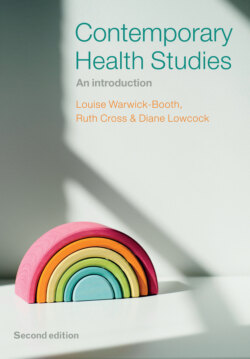Читать книгу Contemporary Health Studies - Louise Warwick-Booth - Страница 36
Learning task 1.2 Comparing definitions Activity
ОглавлениеCompare and contrast two different definitions of health as discussed.
1 What do the definitions have to offer in terms of furthering our understanding of health?
2 What are the limitations of them? What are their strengths?
3 How would you alter the definitions? What would you add or remove and why?
4 How do the definitions compare or contrast with your own definition of health from learning task 1.1?
The variety and breadth of definitions of health presented here are not exhaustive but they serve to illustrate the many different ways in which health can be conceived and experienced and the problematic nature of trying to produce a definition that suits everyone. Downie and Macnaughton (2001: 11) argue that ‘health does not have a clear identity of its own’ and therefore we are faced with a real challenge when trying to define what it is. However, what we do know is that health is influenced by a wide range of factors. This will be discussed in more detail throughout this book.
Essentially the concept of health is not static or stable over time or within different contexts. It is influenced by a plethora of things and means different things to everyone. The meaning of health is also contested and, as has been demonstrated, ‘there is no universally agreed definition’ (Pridmore and Stephens, 2000: 30). Indeed, the concept of health remains elusive (Johnson, 2007). In his book Creating Health for Everyone: Principles, Practice and Philosophy, Colin Johnson (2007) offers a definition of health that extends to nearly four pages, which illustrates the nebulous nature of it and the somewhat impossible task of trying to produce a universally acceptable definition! However, he does state that ‘the concept of health is a cluster of sub-concepts, which together constitute a dynamic whole’ (p. 91) acknowledging the range of influences on understanding. Johnson (2007) offers a framework of definitions of health that has four categories of definition – dictionary definitions, assumptive definitions, determinist definitions and spiritual definitions. While the framework Johnson uses provides a valuable contribution to our knowledge about definitions of health we are really not that much further forward in terms of concrete understanding (and, indeed, we may never be). The extent to which this actually matters is debatable.
Given the difficulties of trying to produce a satisfactory definition of health, the next section of this chapter will examine different theoretical perspectives on the nature of health and consider what these might have to offer to our understanding of ‘what health is’.
